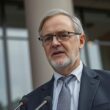Ahead of parliamentary discussions regarding the planned new defense service, the Bundestag’s Military Commissioner, Henning Otte (CDU), has called for revisions to allow for a faster introduction of mandatory service if necessary. While emphasizing the principle of voluntary participation, Otte expressed significant doubts about its feasibility, citing the Bundeswehr’s longstanding struggle to reach its troop strength as a volunteer-only force.
He argued for establishing the necessary groundwork now to facilitate a swift transition to additional compulsory elements should the situation demand it. A key element of this will be a timely interim assessment, conducted shortly after the completion of the registration questionnaires, to gauge response rates and identify levels of voluntary interest. Otte cautioned against delaying such evaluations for a year or two, emphasizing the urgency of the situation.
The proposed legislation, intended to make defense service more attractive and initially including reintroduction of a registration process for young men followed by mandatory fitness assessments, was slated for initial debate in the Bundestag next Thursday, with a hoped-for adoption before the end of the year. However, the ruling CDU/CSU coalition has temporarily halted the debate to secure agreement on amendments to the draft legislation presented by Defense Minister Boris Pistorius (SPD). The Union parties are seeking more precise definitions regarding the conditions under which voluntary defense service could be transitioned to a compulsory obligation.
Otte voiced concerns about postponing consideration of the draft within parliament, asserting that the debate belongs in the legislative forum. He highlighted the Bundeswehr’s ongoing challenge in securing and retaining sufficient personnel to meet its operational requirements, pointing out that while the coalition agreement prioritizes a voluntary defense service, the organization’s inability to consistently achieve its troop strength targets demonstrates the limitations of this approach.
Otte affirmed his commitment to constructively and critically monitoring the evolution of the initiative. He stressed that any modifications must prioritize strengthening the military and avoiding overburdening personnel. He underscored that effective defense requires more than just legislative action, demanding investment in infrastructure, training capacity and equipment. He concluded by emphasizing that security is not guaranteed and requires individuals willing to defend it and that engaging young people meaningfully involves trusting them to be part of the solution, rather than shielding them.





